
|
Feeling the heat The special sheds light on those who have to work in the sun all day and are often without adequate protection or high-temperature allowance. |
| Watch how they are doing in summer day | |
|
Chen Dongdong carefully removed an ice sculpture in the shape of a large wine bottle from the freezer to a van. He covered it in thick blankets to keep it from melting or chipping. Chen, 37, has been working in one of the biggest ice-making plant in Beijing for six years. Temperatures in Beijing rise to 36 C in summer when the plant enters its busiest season. This may seem the perfect job to chill out in the hot summer but their demanding work means they have little time to cool down. As the demand for ice goes up, Chen and his colleagues work in shifts to keep the plant running 24 hours a day. Ice produced there is mainly used to keep vegetables and seafood fresh and provide decorative ice sculptures. [>>>more] | |
|
|
After six years of working as a traffic police officer, 32-year-old Mao Lixin said working under the Hangzhou sun is no longer a challenge. The sun bakes the city's flyovers where Mao has to spend eight hours each day. There is hardly any shade. "The most important thing is to drink as much water as possible, but the problem is there is no toilet," he said. Mao's shift starts at 6:45 am and ends at 11:45 am. After three hours' rest, he sets off again on duty until the evening rush hour ends. The Hangzhou native said that it is not the heat that concerns him most but vehicles breaking down. [>>>more] |
| Summer heat brings surge in patients in Shanghai's hospitals | ||
|
Although it's still early morning on FengQiming's work day, the doctor has already been busy with emergency patients. After finishing her daily morning wards rounds, Feng, who works in the Emergency Department of Shanghai No 6 People's Hospital, had to hurry to the emergency room to see other patients. "Since summer, we have received many patients. The medical staff here have been on the run all day," she said. "The number of patients has increased significantly in recent days, especially during the afternoon and night. Patients include both the elderly and young," Feng said. "Many elderly people have chronic diseases which easily worsen in the summer heat while young people have been staying in air conditioned rooms for a long time, and consequently become sick." |
|
Statistics from the Shanghai Health and Family Planning Commission show the city's large general hospitals have been faced with a high influx of patients, averaging a total of 10,000 daily, an increase of 10 to 20 percent on last month. Among them, patient numbers at Huashan, Renji and Xinhua hospitals have reached as high as 14,000. According to Shanghai's Huashan Hospital, the number of outpatients in recent days has increased 10 to 15 percent, or a growth of 1,000 to 1,500 patients each day on average. On July 1, the total number of inpatients, outpatients and visitors to emergency and first aid rooms approached 14,000. When China Daily visited Huashan Hospital, the hospital's transfusion room was filled with patients. Most of them were elderly and suffering from chronic diseases such as heart disease and hypertension. [>>>more] |
| Hot tips to stay cool in steamy summer | ||
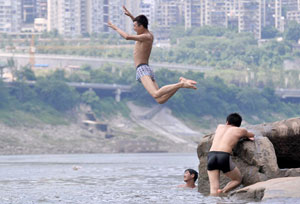 |
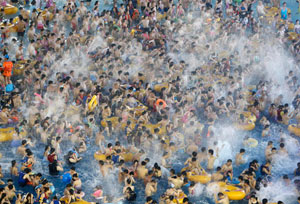 |
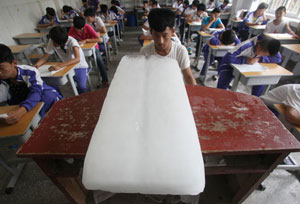 |
 |
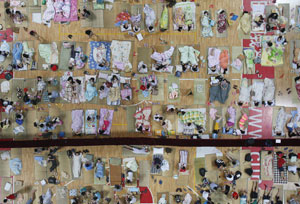 |
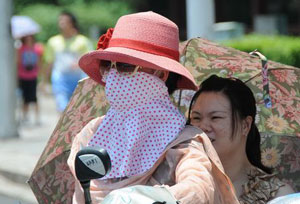 |
| Paragons in different posts | ||
|
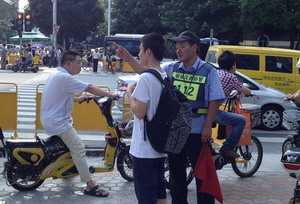 Lin Weihai, an auxiliary traffic police officer in down-town Fuzhou, the country's "No 1 Furnace", described his job as an energy-sapping test of will.
The 45-year-old, who works from 7:30 am to 12 am and 3 pm to 7 pm, has been braving the scorching sun in the capital city of Fujian province for five summers. [>>>more]
|
For Liu Kai, one of Shanghai's few bus drivers who are still driving without any air-conditioning, the nightmare starts in June. "June, July, August and September are the worst months of the year as temperatures (inside the bus) could be as high as 40-plus degrees," said the 49-year-old Shanghai native. [>>>more] |
Ma Qinghui, a 38-year-old man from Tonghua, Jilin province, has been an express courier in Beijing for six years. His job consists of delivering and collecting packages and letters within the greater Huixinli community in Beijing's Chaoyang district. [>>>more] |
|
Yin Chenglin has an eyesight problem but it does not prevent him from doing an excellent job in Guangzhou, Guangdong provicne. "I walk around the street more often than other workers – just to find and clean trash left," Yin said. [>>>more] |
On a busy road in the downtown Tianhe district of Guangzhou,Guangdong province, Xiao Fusheng ride tricycles for bottled water delivery. Xiao, 40, from Hunan province, then brings them to households and offices nearby. [>>>more] |
Yu Jing, 21, from Wanzhou, Chongqing, has been a security guard at a residential park in the city for two years. Yu dresses in his uniform, a baseball hat, light yellow shirt, red tie, and a pair of brown trousers despite the unforgiving heat. [>>>more] |
| Unions should help workers fight for allowances: expert |
|
Trade unions should play a stronger role in protecting workers' rights by helping them get high-temperature allowances, a labor rights expert has said.
Few labor unions in corporations stand up for employees, and central as well as local governments should make more effort to publicize the allowances, said Chang Kai, director of Renmin University of China's Institute for Labor Relations Studies. Workers should also unite under trade unions and let the unions negotiate with employers, he said. "The government's job was not over when it put forward regulations about high-temperature allowances. It had just began," said Chang. According to a State regulation released in June last year, enterprises are required to provide allowances for employees working outdoors in temperatures above 35 C and indoors above 33 C. But standards differ in cities across the Chinese mainland. In Beijing, outdoor workers should get 120 yuan ($19.56) a month from June to August every year, and those working indoors are meant to receive 90 yuan a month. The allowances are part of employees' salaries — they are not welfare benefits that can vary from firm to firm, they are mandatory, Chang said. "If firms know that not paying employees for their work is illegal, they should also understand that holding back allowances violates the law," he said. [>>>>more] |
| Animals stay cool in summer heat | ||
 |
||

Copyright 1995 - 2013 . All rights reserved. The content (including but not limited to text, photo, multimedia information, etc) published in this site belongs to China Daily Information Co (CDIC). Without written authorization from CDIC, such content shall not be republished or used in any form. Note: Browsers with 1024*768 or higher resolution are suggested for this site.
License for publishing multimedia online 0108263 Registration Number: 20100000002731 ![]()
